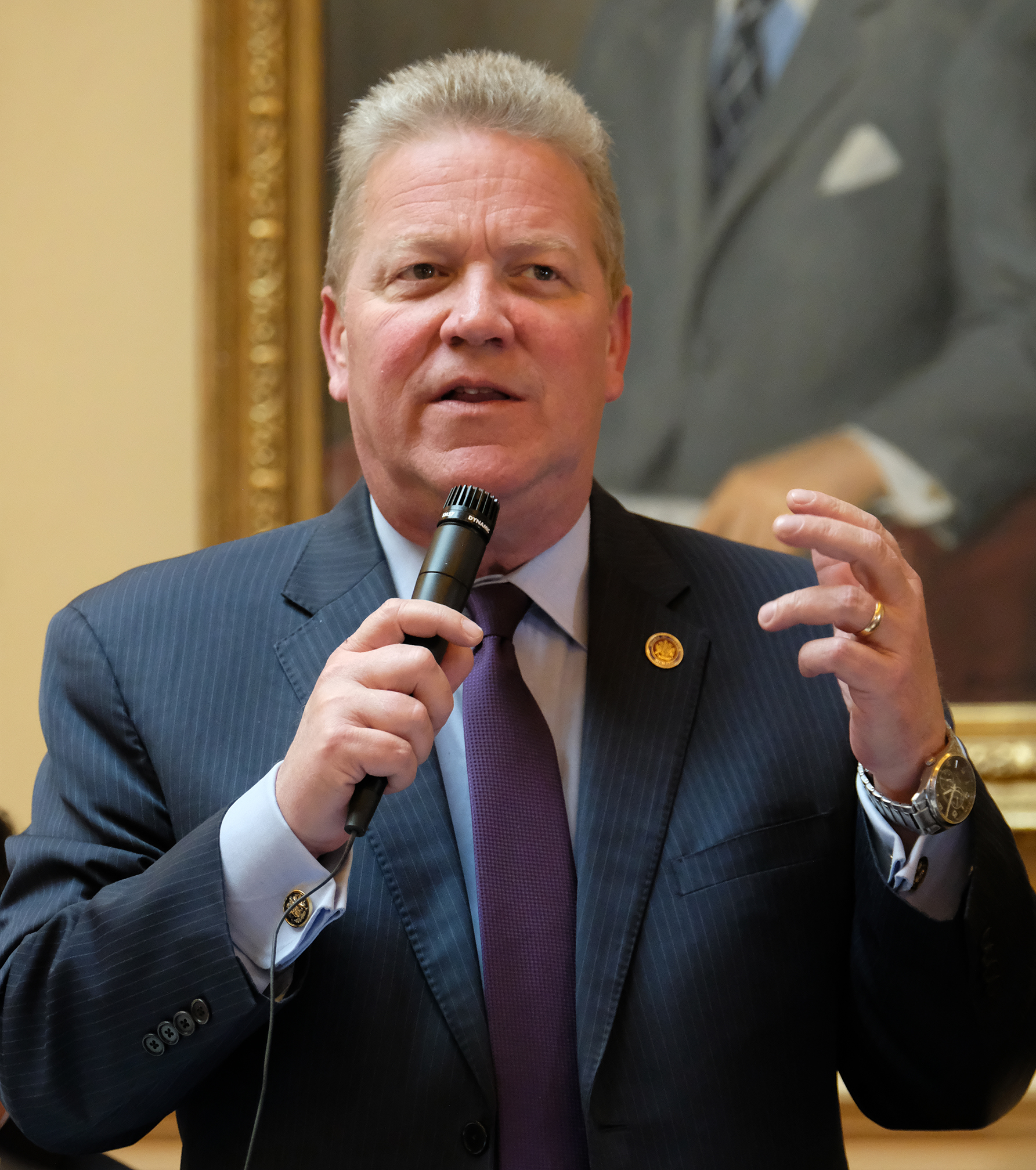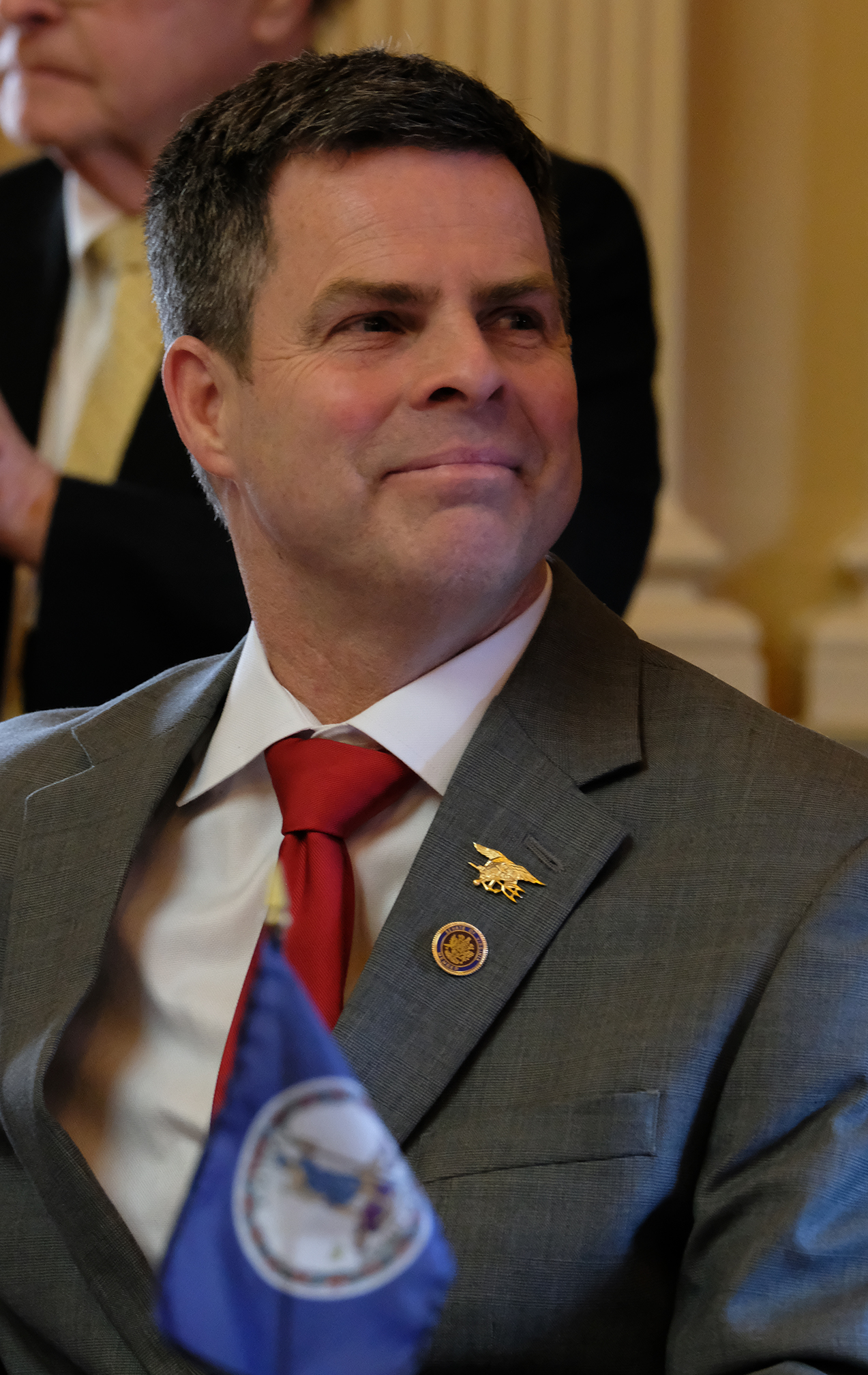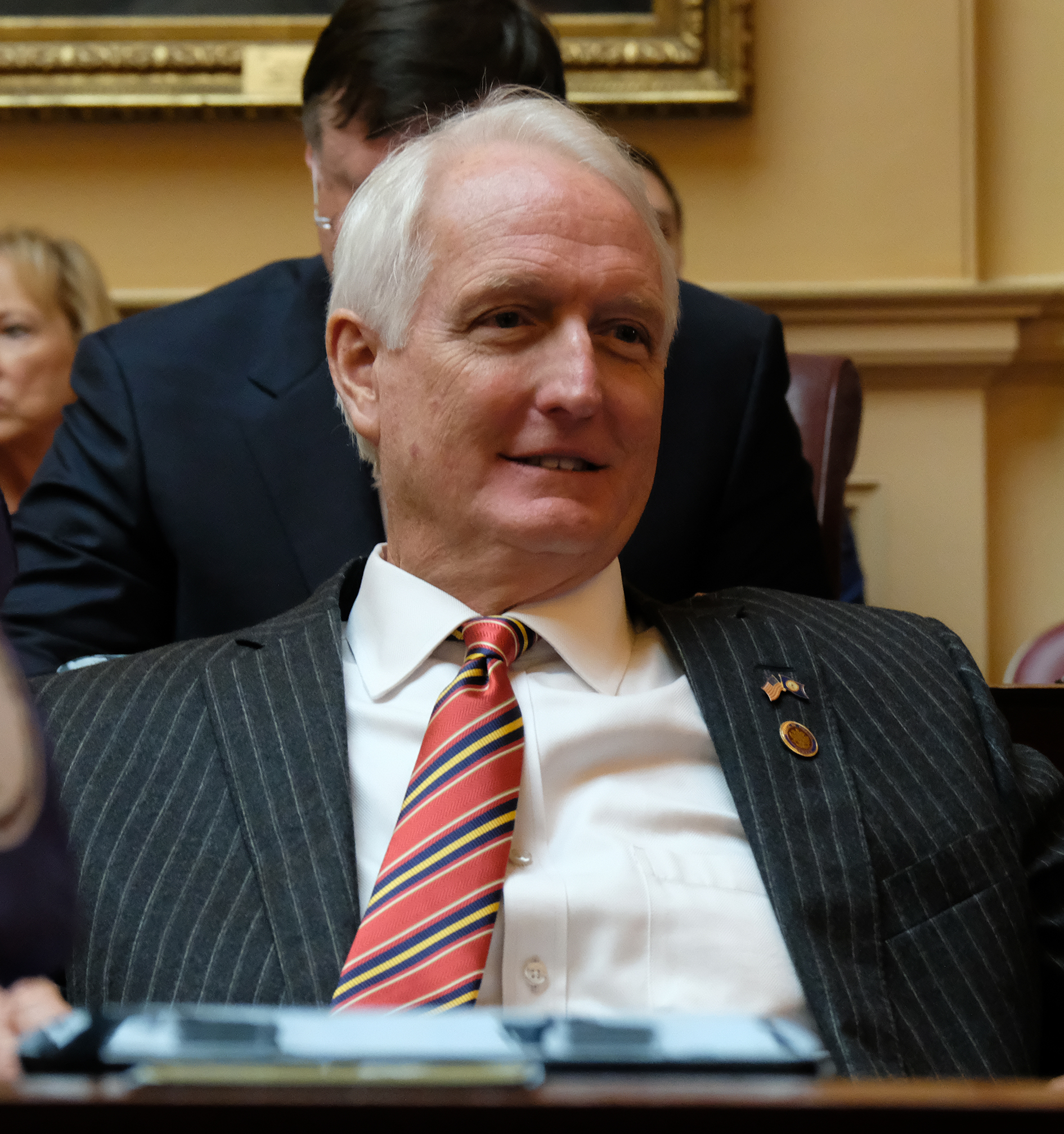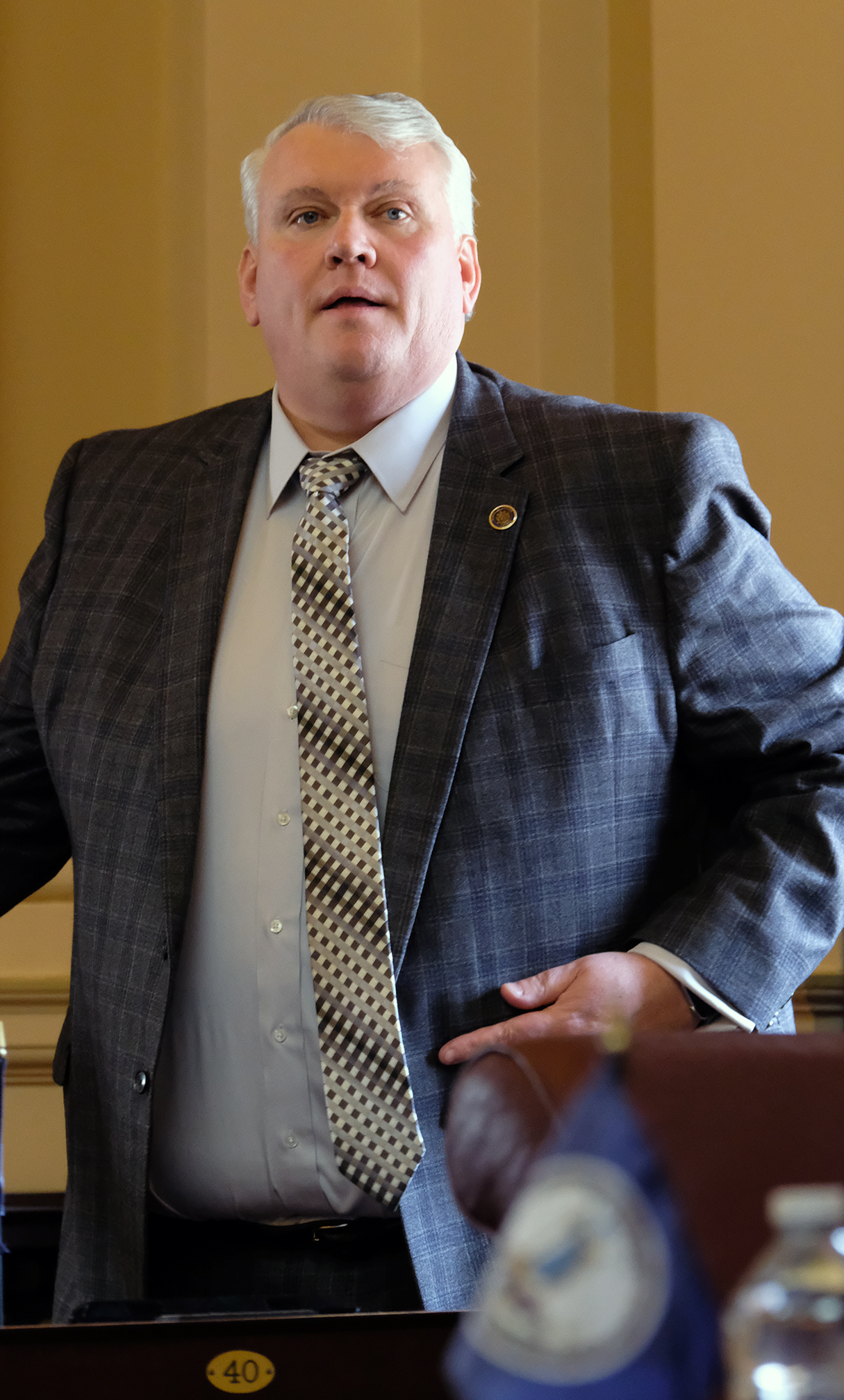Here’s a list of some of the bills drafted by lawmakers from Southwest and Southside Virginia that weren’t discussed in the accompanying General Assembly Halftime Report.
Jump to a specific issue, or keep scrolling to read the full list:
Bills with implications unique to Southwest and Southside
Bills with statewide implications
Broadband
Both the House and Senate advanced bills focused on deploying broadband to Virginia’s rural areas.

House Majority Leader Charniele Herring, D-Alexandria, sponsored HB 800 and Sen. David Marsden, D-Fairfax, filed SB 713. They said their legislation sought to address a federal deadline for spending $750 million in pandemic relief funds on such broadband projects. Money not spent by the end of 2026 would be “clawed back” from the commonwealth, multiple legislators said.
Two issues centered discussion on the bills: the time it takes for utilities to approve the work required to add broadband fiber to their poles, and who is required to pay for outdated poles or to add new ones to handle the additional loads.
Both bills saw changes that addressed concerns from Virginia’s cooperative utilities — their representatives said the bills in their earlier forms would have forced them to raise rates for replacing poles and would negate existing contracts. The bills addressed those issues by the time they emerged from committee hearings. The bills would install the State Corporation Commission as an arbiter in disputes between cable attachers and pole owners; that state did not previously have the power to referee.
Two sets of budget amendments — including one that would add about $80 million to the Virginia Telecommunication Initiative between 2025 and 2026 — are meant to mitigate the price of new poles and other work required to get the poles ready for new cable attachments. They await hearings.
Criminal justice
Freshman Del. Tim Griffin, R-Bedford Country, came out swinging in his first session, but his plan to bring back the death penalty as a punishment for capital murder in Virginia was killed by a House Courts of Justice subcommittee by a 6-2 vote.
Virginia was the first Southern state to abolish capital punishment in 2021. Griffin’s HB 394 would have also required the Supreme Court of Virginia to prioritize the review of cases in which a death sentence has been imposed over other cases pending in the court.

A proposal by Sen. Mark Peake, R-Lynchburg, that creates a rebuttable presumption against bail for certain criminal offenses was defeated on an 8-7 party-line vote in the Senate Courts of Justice Committee last month. SB 38 would have also required the court to consider specified factors when determining whether the presumption against bail has been rebutted and whether there are appropriate conditions of release.
A companion measure to Peake’s proposal by Del. Jed Arnold, R-Smyth County, failed in the House when a Courts of Justice subcommittee killed it on a 5-3 vote.
In the House, Del. Tom Garrett, R-Buckingham County, filed HB 488, which raises the penalty for sexual abuse of a child who is 13 or 14 years of age to a Class 6 felony. Under current law, the offense is a Class 1 misdemeanor. The bill was left in committee.
Education
Sen. Bill Stanley, R-Franklin County, introduced SB 5, which seeks to create a grant fund for STEM+C robotics competition teams in underserved public school divisions and fund qualifying schools with up to $10,000. While the Senate passed the measure by a unanimous vote, it still faces hurdles in the House, where the House Appropriations Committee killed an identical measure last year.

Stanley also filed SB 27, which would establish a Public School Trades Incentive Fund and Program that would provide grants to school districts aiming to restore programs that teach students skilled trades that lead to earning industry-recognized certifications or credentials. The Senate passed the proposal earlier this month by a unanimous vote.
Another Stanley proposal — SB 62 — was continued to 2025 by the Senate Finance and Appropriations Committee. The measure would have required the New College Institute in Martinsville to design and implement any workforce development programs necessary to support the initiatives of the Office of the Governor, including adult education and workforce training programs.
Three identical proposals sponsored by Republicans from Southwest Virginia and Southside that would give home-schooled students the right to play interscholastic sports never made it out of subcommittee.
Each of the proposals (HB 17, filed by Del. Tom Garrett, R-Buckingham County, HB 65 by Del. Ellen Campbell, R-Rockbridge County, and HB 411 by Del. Tim Griffin, R-Bedford County) would have permitted reasonable fees to be charged to home-schooled students to cover the costs of participation in such interscholastic programs.

In the Senate, Sen. John McGuire, R-Goochland County, had introduced a similar measure with SB 84, which was also killed by the Senate Education and Health Committee. The same panel rejected another McGuire measure that would have removed some hurdles for parents wanting to home-school their children.
A Senate committee also rejected a McGuire measure that would have required parental notification by public schools in cases where a student identifies as a gender other than their biological sex.
The proposal, named Sage’s Law after a Virginia teenager whose adoptive mother said the teen was bullied and assaulted at school after they asked to be called by a boy’s name, was passed by indefinitely by the Senate Education and Health on a 9-6 vote.
Economic development
A proposal by Sen. Bill Stanley, R-Franklin County, which would designate small motor sports facilities as historic landmarks and make them enterprise zones for tax purposes, advanced in the Senate by a unanimous vote last week.
Elections
In the state Senate, Sen. Mark Peake, R-Lynchburg, filed several bills that would add layers to ensure secure elections, but that would also make it harder for some voters to cast their ballots. All of them were nonstarters for Democrats, who swiftly rejected them.

Among them was a measure that would have required general registrars to verify that the name, date of birth and Social Security number provided by an applicant on the voter registration application match the information on file in the Social Security Administration database or other database approved by the State Board of Elections. SB 32 failed before the Senate Privileges and Elections Committee on a 8-6 party-line vote.
The same committee also defeated SB 42, which sought to limit the availability of absentee voting in person to the three-week period immediately preceding an election, as well as Peake’s SB 92, which would have allowed voters to register in person up to the day of the election only at the office of their general registrar.
Peake also made another unsuccessful attempt at bringing back Virginia’s voter ID requirements. While Virginia already requires voters to present identification while voting, currently acceptable forms of ID include Virginia driver’s licenses, U.S. passports and student IDs, but also copies of utility bills or bank statements, which bear the voter’s address but no photo.
Peake’s SB 45, which would have added the photo requirement back to the statute while also repealing a provision allowing a voter who does not have one of the required forms of identification to vote after signing a statement, failed on an 8-6 party-line vote after being rolled into SB 81, sponsored by Sen. John McGuire, R-Goochland County.
And Peake’s SJ 10, a constitutional amendment that would limit the lieutenant governor and attorney general to two terms, was continued to the 2025 session by a unanimous vote.

Sen. David Suetterlein, R-Roanoke County, brought back legislation that would prohibit lawmakers from fundraising for their campaigns on any day the General Assembly is scheduled to meet during a special session. Currently, such campaign fundraising is prohibited only during regular sessions of the General Assembly.
While Suetterlein’s SB 107 passed during its first reading in the Senate last week, the body later referred it back to the Privileges and Elections in amended form.
Suetterlein’s SB 109 advanced in the Senate on a 30-10 vote last month. The measure provides that when a candidate’s name appears on the primary ballot but they do not receive their party’s nomination, their name must not be printed on the ballots for that office in the succeeding general election.
Del. Joe McNamara, R-Roanoke County, and Del. Tommy Wright, R-Lunenburg County, filed similar proposals with HB 90 and HB 55, which passed in the House 83-16 and 99-0 on Tuesday.
Wright was less successful with his HB 56, which would have required voters to disclose their party affiliation when registering to vote. Under Wright’s bill, voters who registered prior to Jan. 1, 2025, would have been designated as independent by default unless they provide a political party affiliation to the general registrar, but the measure wasn’t taken up by a committee this year.
A House Privileges and Elections subcommittee last month rejected a proposal by Del. Tom Garrett, R-Buckingham County, to amend the state constitution to allow a governor to serve two terms in office — either in succession or not in succession — beginning with the governor elected in 2029. Virginia is the only state where the constitution prohibits a second consecutive term.
Another Garrett measure that sought to establish a joint committee of the House and Senate Committees on Privileges and Elections to study the costs and benefits of 45 days of early voting was never taken up during this session.
And HB 79, sponsored by Del. Ellen Campbell, R-Rockbridge County, failed on a unanimous 8-0 subcommittee vote. The proposal would have allowed for special elections to be held on the same day as a primary election.
Del. Jed Arnold, R-Smyth County, had more luck with his HB 429, which would require all candidates running for constitutional offices (treasurer, sheriff, commonwealth’s attorney, clerk of court and commissioner of the revenue) that are nominated by a political party to be identified by the name of their political party on the ballot.
Currently only candidates for federal, statewide and General Assembly offices are so identified. Arnold’s measure passed unanimously with a substitute in a House Privileges and Elections subcommittee after being rolled into a similar bill by Del. Debra Gardner, D-Chesterfield County.
But the same committee rejected the chamber’s most ambitious proposal — introduced by Del.- Tim Griffin, R-Bedford County — by a 8-0 vote last month. Griffin’s HB 393 pushed for a nearly complete overhaul of Virginia’s voter registration system that proved too extensive even for Republicans.
Energy
Customers in Appalachian Power’s service territory are moving closer to having a shared solar program for the first time, while it appears likely that customers of Dominion Energy will see an expansion of that utility’s existing program.
HB 108, sponsored by Del. Rip Sullivan, D-Fairfax County, and SB 255, from Senate Majority Leader Scott Surovell, D-Fairfax County, would establish Appalachian’s shared solar program next year at a maximum capacity of 50 megawatts.
Sullivan’s HB 106 and Surovell’s SB 253 would increase the size of Dominion’s existing program next year from 200 megawatts to 350. All four bills cleared their respective chambers of the General Assembly on Tuesday.
Shared solar, or community solar, allows a customer to buy electricity from a solar company without needing to own solar panels. Proponents say it can help customers save money using clean energy, but critics say such programs shift costs onto utility customers who aren’t participating.
Meanwhile, legislation that would give state regulators more authority to approve large solar, wind and battery storage projects — even in some cases where a local government denies such projects — was carried over for a year.

Sen. Creigh Deeds, D-Charlottesville, said he introduced SB 567 because he’s concerned about Virginia meeting state-mandated clean-energy goals but said his bill “is probably not ready for prime time.”
Sullivan said his similar bill, HB 636, was intended to bring attention to “an important conversation for us to have,” and he’d like to see that conversation continue.
Deeds suggested the legislation could head to the Commission on Electric Utility Regulation for further review. The commission is designed to study regulatory matters with more time than lawmakers are generally afforded during the General Assembly.
Several other energy-related bills were carried over for a year with lawmakers suggesting they go to the commission, including bills focusing on grid-enhancing technologies, energy-efficiency programs and how to pay for infrastructure that serves data centers.
Another bill related to approval of solar projects, SB 697 from Sen. Schuyler VanValkenburg, D-Henrico County, passed the Senate 21-18 on Monday.
VanValkenburg’s legislation would prevent localities from enacting blanket regulations that limit solar development unless the total area covered by panels exceeds 4% of the locality’s total land area.
The proposal comes as some local governments, particularly in Southside Virginia, have been tapping the brakes on new large solar farms, including by implementing or considering caps on the amount of land that can be used for such projects.
VanValkenburg told the Senate on Monday that his bill doesn’t require localities to approve projects but it does require them to have a process for evaluating solar projects on an individual basis.
But Sen. Bill Stanley, R-Franklin County, characterized the bill as an attempt by other parts of Virginia to force Southside and Southwest Virginia to sacrifice valuable agricultural land for solar facilities. “I know that people that live in Southside and Southwest Virginia are tired of getting patted on the head and told what to do,” Stanley said.
Two bills that would allow Appalachian Power and Dominion Power to ask the State Corporation Commission to approve charging their customers for the costs of developing small modular nuclear reactors, or SMRs, moved forward in the House and Senate on Tuesday.
The legislation comes 16 months after Gov. Glenn Youngkin announced that he planned to deploy the first commercial SMR on former coal mining land in Southwest Virginia. SMRs are smaller, simpler versions of traditional nuclear reactors and can be built in a factory and shipped to a site.
Both Appalachian Power and Dominion have expressed an interest in developing an SMR, and Dominion has included SMRs in its long-range plans, but no final decisions have been made.
HB 1491, sponsored by Del. Israel O’Quinn, R-Washington County, would apply only to Appalachian Power. If it’s approved, customers would only have to pay the costs of early site permitting, not construction or licensing costs. The State Corporation Commission would review the legislation one per year for five years.
SB 454, sponsored by Sen. David Marsden, D-Fairfax County, would apply to both Appalachian Power and Dominion and would include costs of evaluation, design, engineering, federal approvals and licensing, environmental analysis and permitting, early site permitting and equipment procurement.
Guns
Del. Tom Garrett, R-Buckingham County, introduced HB 16, which would have allowed concealed-carry permit holders to bring their firearms onto state property — including Richmond’s Capitol Square and the surrounding area. The House Public Safety Committee in January killed Garrett’s proposal on a 12-9 party-line vote.
A proposal sponsored by Del. Tim Griffin, R-Bedford County, aimed at doing away with concealed handgun permits altogether. Griffin’s HB 389, which would have allowed anyone who is eligible to obtain a concealed-carry permit to carry a handgun openly without a permit anywhere in the commonwealth, wasn’t taken up in committee.
Griffin filed a separate bill seeking to give any adult over 21 who applies for a concealed handgun permit the option to also apply for an enhanced concealed handgun permit. Such a permit would allow them to carry a firearm anywhere a law enforcement officer can do so, once they have demonstrated their skill in handling a firearm during a live-fire shooting exercise. A House committee rejected the measure on an 8-2 vote.
In the Senate, Sen. John McGuire, R-Goochland County, filed a measure that would have expanded a concealed handgun permit to a concealed weapons permit, allowing the permit-holder to also carry a range of other weapons. Among the devices covered under SB 82: dirks, bowie knives, stiletto knives, ballistic knives, machetes, razors, sling bows, spring sticks, metal knucks, blackjacks, nunchaku and throwing stars. The measure was defeated in the Senate Courts of Justice Committee on a 9-6 vote.
Tax reform
Democrats so far rejected a number of Republican tax reform proposals. SB 110, sponsored by Sen. David Suetterlein, R-Roanoke County, would have repealed the remainder of the state’s former 2.5% grocery tax after Democrats agreed to slash the state’s 1.5% portion of the grocery tax while retaining the 1% portion that benefits local governments to fund schools. The measure failed before the Senate Finance and Appropriations Committee on a 10-5 party-line vote.
The same committee continued Suetterlein’s SB 108 until next year. The proposal sought to remove the sunset on the elevated standard income tax reduction for single individuals and married couples that is currently scheduled to expire by Jan. 1, 2026. The bill’s companion measure in the House, sponsored by Del. Joe McNamara, R-Roanoke County, shared the same fate.
Miscellaneous bills
By a 40-0 vote, the Senate last month passed SB 26 by Sen. Bill Stanley, R-Franklin County, which would allow drinking alcohol at campgrounds located on private properties.
A Democratic-led House committee in late January on a 6-4 party-line vote rejected legislation that would have required social media applications like TikTok and Instagram to stop letting kids use their platforms when they’re supposed to be sleeping. HB 562, sponsored by Del. Ellen Campbell, R-Rockbridge County, sought to prohibit commercial social media platforms from allowing access between midnight and 6 a.m., unless the minor’s parent, guardian or legal custodian has given permission.
A renewed attempt by Del. Joe McNamara, R-Roanoke County, to pass legislation that would abolish Eastern Standard Time in the commonwealth wasn’t taken up at all this year. HB 6 would have required Virginia to observe Eastern Daylight Time year-round upon the enactment of a law by the U.S. Congress allowing states to make the change.
It might soon be easier to claim roadkill for dinner. The House passed 98-0 HB 1025 by Del. Tony Wilt, R-Rockingham County, that would allow anyone who finds a bear, deer, elk or turkey dead on the roadway to claim the animal, with certain requirements. Current law only allows the driver of the vehicle who killed the animal to claim it, and limits those animals to bear and deer.
Bills with implications unique to Southwest and Southside
After his proposal seeking to add Giles and Pulaski counties to the territory eligible for Tobacco Commission funds failed last year, Del. Jason Ballard, R-Giles County, brought the legislation back for the 2024 session in modified form. HB 297 would have added all of Planning District 4 (the counties of Floyd, Giles, Montgomery and Pulaski and the city of Radford) to the commission’s territory, but a House subcommittee voted against the measure 8-2.
An attempt to convert the nonprofit Virginia Museum of Transportation in Roanoke into a state agency has been shunted onto a sidetrack. The Senate Finance Committee continued SB 418 by Sen. Chris Head, R-Botetourt County, until 2025, although that’s further than similar bills have gotten in the past. The House version, HB 802, by Del. Sam Rasoul, D-Roanoke, died in a House Appropriations subcommittee by a 6-2 vote.
The House passed 98-0 HB 1511 by Del. Eric Phillips, R-Henry County, that would require Martinsville to hold a referendum before any reversion to town status can be approved.

Across the hall in the state Senate, Sen. Travis Hackworth, R-Tazewell County, was more successful with his SB 25, which would change the way the Virginia Brownfield and Coal Mine Renewable Energy Grant Fund and Program can allocate funds. Under current law, the fund is prohibited from allocating funds unless there are federal funds available to cover the cost. Hackworth’s bill, which would eliminate that provision, unanimously passed in the Senate at the end of January.
Sen. David Marsden, D-Fairfax County, introduced a bill to ban hunters from releasing hunting dogs on state roads. Some have complained that hunters do this on purpose so their dogs can run onto private land and hunters can follow them under the guise of retrieving their dogs. SB 712 died on a tie vote.






Comments are closed.